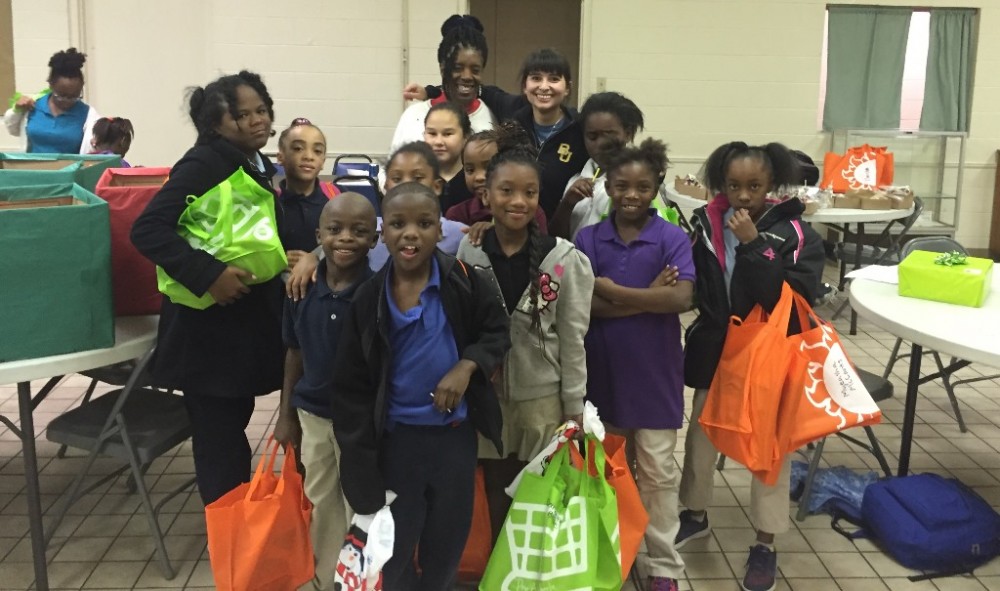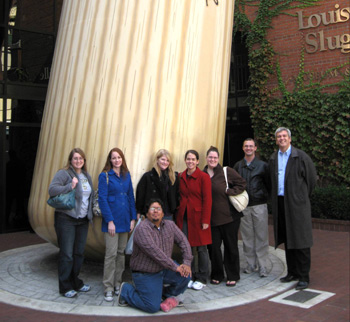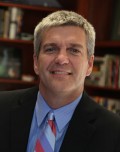
When Janessa Blythe discovered through a college leadership course that kids in her Waco, Texas community didn’t have access to books, she decided to act.
The junior at Baylor University is launching Waco Up & Read, a program that provides books for kids from low-income communities. “It appalled me that kids didn’t have access to stories and didn’t have access to books in general,” says Janessa, “that sent me on a little bit of a journey — what can I do about this?”
Janessa’s book drive provided each kid at Restoration Haven, a Waco community support organization, with eight books to call their own. For many, those books make up their entire home libraries. Working with Restoration Haven, Janessa is planning to provide more books through a pilot program, and establish Waco Up & Read as a nonprofit.
Her plans are ambitious, but Janessa understands the kind of impact that books can have.
 “Stories teach kids that when hard times come, or you hit a brick wall in life, that you can break through – that is a major matter you see in good stories.”
“Stories teach kids that when hard times come, or you hit a brick wall in life, that you can break through – that is a major matter you see in good stories.”
And exposing kids to good stories is important to Waco Up & Read. Janessa plans to use the First Book Marketplace to give kids access to rich and varied content.
“Obviously that includes classic children’s books, but in general I’m looking for books that teach virtue, teach empathy, that teach human issues.”
To do that though, Janessa will need to raise money for Waco Up & Read. One way she is doing that is through First Book campaigns, which makes the fundraising process simple and easy.
All across the country kids in need lack access to books and stories, but the kids in Waco communities have a champion in Janessa. Book drives, fundraising, and eventually a nonprofit organization – that can seem like a lot for a college student but it’s as simple as identifying a need, and meeting it.
And that is something we are all capable of.
If you serve kids in need, please visit the First Book Marketplace to explore our variety of educational resources. To raise money and make an impact in your community, start a First Book campaign to provide books to kids in need.
The post How One College Student is Making an Impact in Her Community appeared first on First Book Blog.

 For this week’s contribution to OUPblog, we’ve gone audio — we are the Oral History Review, after all. In our first podcast, our guest Stephen Sloan elaborates on “On the Other Foot: Oral History Students as Narrators,” a piece he wrote for the most recent issue of the Oral History Review (volume 39, issue 2). This post represents another first: an effort to give current and future Oral History Review contributors room to discuss their articles further.
For this week’s contribution to OUPblog, we’ve gone audio — we are the Oral History Review, after all. In our first podcast, our guest Stephen Sloan elaborates on “On the Other Foot: Oral History Students as Narrators,” a piece he wrote for the most recent issue of the Oral History Review (volume 39, issue 2). This post represents another first: an effort to give current and future Oral History Review contributors room to discuss their articles further.
Listen below:
[See post to listen to audio]
Or download the mp3 directly from this link.
As with all of our efforts here, we welcome comments.
 Stephen Sloan is the director of the Institute for Oral History at Baylor University where he teaches a graduate seminar in oral history. He also leads dozens of workshops on oral history each year for community groups, students, and faculty. Sloan, along with the entire staff of the Institute for Oral History, offers an online introduction to oral history twice yearly. To learn more about Dr. Sloan or the work of the Institute for Oral History visit baylor.edu/oralhistory. E-mail: Stephen_Sloan[at]baylor[dot]edu. His article “On the Other Foot: Oral History Students as Narrators” in the latest issue of Oral History Review is available to read for free for a limited time.
Stephen Sloan is the director of the Institute for Oral History at Baylor University where he teaches a graduate seminar in oral history. He also leads dozens of workshops on oral history each year for community groups, students, and faculty. Sloan, along with the entire staff of the Institute for Oral History, offers an online introduction to oral history twice yearly. To learn more about Dr. Sloan or the work of the Institute for Oral History visit baylor.edu/oralhistory. E-mail: Stephen_Sloan[at]baylor[dot]edu. His article “On the Other Foot: Oral History Students as Narrators” in the latest issue of Oral History Review is available to read for free for a limited time.
The Oral History Review, published by the Oral History Association, is the U.S. journal of record for the theory and practice of oral history. Its primary mission is to explore the nature and significance of oral history and advance understanding of the field among scholars, educators, practitioners, and the general public. Follow them on Twitter at @oralhistreview and like them on Facebook to preview the latest from the Review, learn about other oral history projects, connect with oral history centers across the world, and discover topics that you may have thought were even remotely connected to the study of oral history. Keep an eye out for upcoming posts on the OUPblog for addendum to past articles, interviews with scholars in oral history and related fields, and fieldnotes on conferences, workshops, etc.
Subscribe to the OUPblog via email or RSS.
Subscribe to only history articles on the OUPblog via email or RSS.
Image credit: All articles used with permission of Stephen Sloan. All rights reserved.

According to surveys, 95% of Americans believe in God. Although it can sometimes feel that the greatest rifts are between believers and non-believers, disputes are more often caused between groups of believers who simply don’t agree about what God is like. In America’s Four Gods: What We Say About God – and What That Says About Us, Paul Froese and Christopher Bader use original survey data, in-depth interviews, and “The God Test” to reveal the four types of god most American’s believe in. Indeed, this is the most comprehensive and illuminating survey of Americans’ religious beliefs ever conducted.
In The God Test, the four gods presented are the Authoritative God, the Benevolent God, the Critical God, and the Distant God.
What distinguishes believers in an Authoritative God is their strong conviction that God judges human behavior and sometimes acts on that judgment. Indeed, they feel that God can become very angry and is capable of meting out punishment to those who are unfaithful or ungodly. Americans with this perspective often view human suffering as the result of Divine Justice. Approximately 31% of Americans believe in an Authoritative God.
Like believers in the Authoritative God, believers in a Benevolent God see His handiwork everywhere. But they are less likely to think that God judges and punishes human behavior. Instead, the Benevolent God is mainly a force of positive influence in the world and is less willing to condemn individuals. Believers in this God feel that whether sinners or saints, we are all are free to call on the Benevolent God to answer our prayers in times of need. Approximately 24% of Americans believe in a Benevolent God.
Believers in a Critical God imagine a God that is judgmental of humans, but rarely acts on Earth, perhaps reserving final judgment for the afterlife. The Critical God appears to hold a special place in the hearts of those who are the most in need of help yet are denied assistance. Approximately 16% of Americans believe in a Critical God.
Believers in a Distant God view God as a cosmic force that set the laws of nature in motion and, as such, the Distant God does not really “do” things in the world or hold clear opinions about our activities or world events. In fact, believers in a Distant God may not conceive of God as an entity with human characteristics and are loathe to refer to God as a “he.” When describing God, they are likely to reference objects in the natural world, like a beautiful day, a mountaintop, or a rainbow rather than a human-like figure. These believers feel that images of God in human terms are simply inadequate and represent naïve or ignorant attempts to know the unknowable. Approximately 24% of Americans believe in a Distant God.

 “Stories teach kids that when hard times come, or you hit a brick wall in life, that you can break through – that is a major matter you see in good stories.”
“Stories teach kids that when hard times come, or you hit a brick wall in life, that you can break through – that is a major matter you see in good stories.”


 For this week’s contribution to OUPblog, we’ve gone audio — we are the Oral History Review, after all. In our first podcast, our guest Stephen Sloan elaborates on
For this week’s contribution to OUPblog, we’ve gone audio — we are the Oral History Review, after all. In our first podcast, our guest Stephen Sloan elaborates on  Stephen Sloan is the director of the Institute for Oral History at Baylor University where he teaches a graduate seminar in oral history. He also leads dozens of workshops on oral history each year for community groups, students, and faculty. Sloan, along with the entire staff of the Institute for Oral History, offers an online introduction to oral history twice yearly. To learn more about Dr. Sloan or the work of the Institute for Oral History visit
Stephen Sloan is the director of the Institute for Oral History at Baylor University where he teaches a graduate seminar in oral history. He also leads dozens of workshops on oral history each year for community groups, students, and faculty. Sloan, along with the entire staff of the Institute for Oral History, offers an online introduction to oral history twice yearly. To learn more about Dr. Sloan or the work of the Institute for Oral History visit